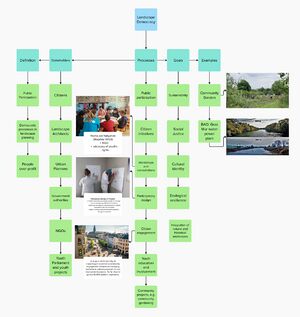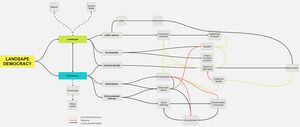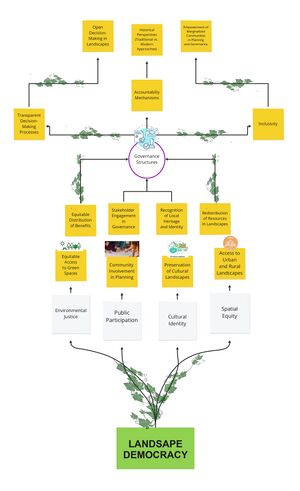Democratic Landscape Transformation 2024 - Team 3: Difference between revisions
| (3 intermediate revisions by 2 users not shown) | |||
| Line 48: | Line 48: | ||
===Overview of your concept maps (individiual and integrated)=== | ===Overview of your concept maps (individiual and integrated)=== | ||
[[File:Concept Map OLA 2024-06-30 16-16-45.jpg|thumb|Concept Map 1|300px|none]] | |||
[[File:Concept Map OLA 2024-06-30 16-16-45.jpg|thumb|Concept Map 1]] | [[File:Amin Farzinfar- Concept Map.jpg|thumb|300px|none]] | ||
[[File:Amin Farzinfar- Concept Map.jpg|thumb]] | [[File:Chakir yahyaoui landscape democracy.jpg|thumb|300px|none]] | ||
== Please finish with a short reflection == | == Please finish with a short reflection == | ||
* What are the similarities and differences in your team regarding your understanding of what democratic landscape transformation is? | * What are the similarities and differences in your team regarding your understanding of what democratic landscape transformation is? - > Our team believes democratic landscape transformation lets diverse voices shape the environment. We agree it needs inclusive participatory processes. But we focus on different things. Some of us care more about policy and governance. Others think community engagement and environmental sustainability matter most. | ||
* In how far did the seminar lectures and readings help you to clarify this? | * In how far did the seminar lectures and readings help you to clarify this? | ||
* - > Seminar lectures and readings made us smarter. They gave us theory and real-life examples. We now get tricky ideas better. We saw how democracy works in landscape projects. Experts and case studies showed us the way. | |||
* What will you take home from this seminar? | * What will you take home from this seminar? | ||
* -> This seminar taught us a lot. We learned how to mix democratic values with landscape projects. We saw why getting the community involved rocks. We picked up cool tools to help everyone have a say. Now we're pumped to use these ideas in our work. We want to make landscapes fair and green for everyone. | |||
[[Category:OLA Working Group 2024]] | [[Category:OLA Working Group 2024]] | ||
Latest revision as of 11:18, 5 July 2024
>>> Back to working group overview
>>> Back to seminar reading list
>>> go to the Editing Help
Background of your team
Please present your team briefly. Which linguistic and cultural perspectives does each member bring in? Which disciplinary backgrounds are present in your team?
- Laura is from Austria, so German is her native language. However, she is also proficient in English. Her academic background is in environmental and bioresource management, which involves studying the sustainable use and conservation of natural resources. This background allows her to approach cultural issues from a perspective rooted in sustainability and ecological awareness.
- Amin is from Iran, He speaks Persian and is fluent in English. He Studied Bachelor of Architecture in Iran and he is studying "Architecture and Creative Practices for City and Landscape" in his master studies at the University of Bologna.
- Chakir Yahyaoui is a student from Morocco, where Arabic is his mother tongue. He is also speak English, French, Russian, and has a basic understanding of German. Chakir's academic background is in architecture, and he is currently pursuing a master degree in Landscape Architecture in Germany, in Weihenstephan-Triesdorf University of Applied Sciences and Nürtingen-Geislingen University. His diverse architectural knowledge provide him with a unique perspective on integrating cultural and environmental elements into landscape Architecture.
- team member 2
- etc....
Your Landscape Democracy Manifestoes
Here you can add links to the manifestoes you have presented on April 24. Please make sure that the links are accessible. You can also add them directly here on the wiki, they need to be png or jpg format then.
- manifesto 1
- https://drive.google.com/file/d/1F3d1rq4fXdxYVIdect4GFTC6kt82n1nl/view
- https://www.canva.com/design/DAGDUiM-MlQ/GuDMLi1T_S2J2WIL6jX0IQ/view?utm_content=DAGDUiM-MlQ&utm_campaign=designshare&utm_medium=link&utm_source=editor
- etc
Readings, concepts and definitions
- Start: April 3, 2024
- Due: July 2, 2024
While working in your group, please start to express your personal understanding of the relation of landscape and democracy in the form of a concept map with linking words or any other diagrammatic representation. Please make your maps very visual and not just verbal. Think critically about why one map differs from another.
The final product is a shared concept map that integrates the various understandings present within your team.
About concept mapping
Before starting the exercise you can read this article by Joseph D. Novak & Alberto J. Cañas about Theory Underlying Concept Maps and How to Construct and Use Them. This paper gives a good explanation of how concept maps are conceived and developed.
You can use any tool you like for producing your concept map. However, since the result needs to be submitted digitally we recommend the following open source software for producing your maps:
- Cmap Tools >>> you can also work with your group on the Cmap cloud doing a shared map
- VUE - The Visual Understanding Environment
- Use a shared whiteboard to develop your integrated concept map, such as MIRO or MURAL
How to present your concept maps
- Possible format: JPG (for wiki upload) or link to any other resource
- We give you below a draft image gallery where you can add pictures of your map (in JPG or PNG format)
- You can present your integrated understanding as one concept map or your present individual ones and the integrated one.
- add as many additional materials as you need
Overview of your concept maps (individiual and integrated)
Please finish with a short reflection
- What are the similarities and differences in your team regarding your understanding of what democratic landscape transformation is? - > Our team believes democratic landscape transformation lets diverse voices shape the environment. We agree it needs inclusive participatory processes. But we focus on different things. Some of us care more about policy and governance. Others think community engagement and environmental sustainability matter most.
- In how far did the seminar lectures and readings help you to clarify this?
- - > Seminar lectures and readings made us smarter. They gave us theory and real-life examples. We now get tricky ideas better. We saw how democracy works in landscape projects. Experts and case studies showed us the way.
- What will you take home from this seminar?
- -> This seminar taught us a lot. We learned how to mix democratic values with landscape projects. We saw why getting the community involved rocks. We picked up cool tools to help everyone have a say. Now we're pumped to use these ideas in our work. We want to make landscapes fair and green for everyone.


